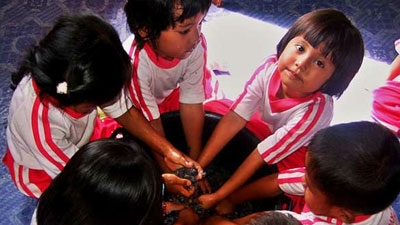Many early childhood education centers now work together with health posts to provide services by health professionals for both children and parents. “This integration has managed to reduce the number of malnutrition cases,” said Ujam, Head of the Health Office in Sukabumi.
In Indonesia, early childhood education comes in a variety of forms. It can be a day care center, a playgroup, an early childhood education center integrated with a health post, a program for families with children under the age of 5, a Quran learning center, or an Islamic kindergarten, which cater for different age groups.
At present, most early childhood education centers work individually. For instance, kindergartens are not integrated with health posts. During the early childhood education national dialog in January 2012, the government agreed to develop integrated early childhood services. According to a national expert, Professor Anna Alisjahbana, who pioneered the health post play group in 2000, “Health posts aim to reduce the gap of a child’s development in terms of health and psycho-social development. In the future, it is expected that the needs of children aged 0 to 6 will be provided within one location, or at a number of different locations, but integrated.” The Early Childhood Education Directorate of the Ministry of Education and Culture, which was established in 2001, hopes that the program will reach 75 percent of Indonesian children by the year 2015.
Challenges: Access, Quality, and Public Perception
The government is continuing its efforts to provide early childhood education for children from poor families. There are now 32.4 million children in Indonesia aged 0 to 6, but less than half have received early childhood education. Those that have not received these services are mostly under the age of 3 and live in rural areas. The government’s challenge is to ensure that they too receive proper services.
The blue print of the Early Childhood Education for 2025 initiative launched in 2011 by the Ministry of Education and Culture mentions the poor quality and competency of teachers. Over 60 percent are high school graduates or only have a two-year college diploma. To improve teachers’ quality, the government plans to provide scholarships, training, and internships, which will require a significant amount of funds.
But many Indonesians do not understand the importance of early childhood education. It is still considered as limited to playing and singing, while many parents expect their children to gain academic knowledge, and quickly too. Parents want their children to be able to count, read and write, in order to pass elementary school exams. This is the reason why parents enroll their children in kindergartens close to the age of 5. However, during the age of 3 to 6, playing is the most effective way to stimulate a child’s language, communication, and motor skills.
Early Childhood Education and Development Program
One of the government’s initiative is the Early Childhood Education and Development Program. Through collaboration with the World Bank and the Kingdom of the Netherlands, this program has provided early childhood education for poor families since 2006. The program hopes that by 2013, it will reach some 738,000 children in 3,000 villages stretched across 50 districts.
The program adopts the concept of community driven development, to instill ownership by the community and help ensure its sustainability. Since the beginning, the program requested local government commitment to the program, in order to ensure its sustainability. Community involvement is very high. For example, the community decides from its own members who will receive training to become a teacher. There are now some 12,000 teachers who have received training to improve the quality of early childhood education. The program has also helped develop a national standard for early childhood education, and this is used as a reference for educational institutions.
In addition to education, the program also provides health check-ups, vitamins, knowledge of practices related to healthy living, and knowledge of family values. The program continues to promote the important role that parents, community, and local governments play in the development of a child. It also stresses the importance of promoting services for families with children under the age of 3.

